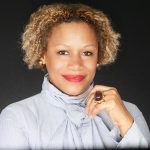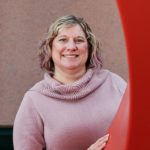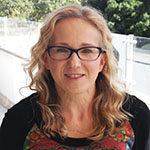 Congratulations to AssociateProfessor Alaina Brenick, whose project, Validating a measure of school-based interpersonal and institutional discrimination experienced by transgender and gender non-binary youth was funded by the UConn Justice, Equity, Diversity, and Inclusion (JEDI) Research Initiative.
Congratulations to AssociateProfessor Alaina Brenick, whose project, Validating a measure of school-based interpersonal and institutional discrimination experienced by transgender and gender non-binary youth was funded by the UConn Justice, Equity, Diversity, and Inclusion (JEDI) Research Initiative.
Faculty
Vida Samuel, HDFS Faculty Spotlight, March 2023
 Vida Samuel came to UConn Stamford in 2016 as an adjunct professor while leading a communication consulting business for women new to leadership positions. She has been an Assistant Professor in Residence in HDFS since 2018.
Vida Samuel came to UConn Stamford in 2016 as an adjunct professor while leading a communication consulting business for women new to leadership positions. She has been an Assistant Professor in Residence in HDFS since 2018.
Vida is a scholar in women’s studies and intercultural communication and received her master’s in speech and interpersonal communication from New York University where she was also an administrator and sat on the Dean’s leadership team. Her interests focus on the sexual lives of women at midlife. During her time at NYU, Vida developed recruitment and retention strategies focused on non-traditional graduate and doctoral nursing students and students of color. She also served as the President of the Greater New York Healthcare Recruiters Association and as the scholarship chair, raising funds for undergraduate nursing student scholarships for New York City nursing students. Vida was instrumental in increasing NYU’s undergraduate student membership to paraprofessional nursing associations. She also sat on the Advance Nurses Magazine Editorial Advisory Board.
After living in New York City for 17 years, Vida left to pursue her PhD with a focus in intercultural communication and women’s studies at Howard University. While in Washington DC, she worked as a researcher at FHI 360, a global, human development, non-profit organization that studies and gathers evidence to deliver community based solutions in the United States and around the world.
Vida is active in her community and is often a featured speaker for issues impacting women and girls. In a 2022 Babe with the Power podcast, she examined the consequences of the Supreme Court’s decision to repeal Roe v Wade on young college women. She facilitated a conversation for young women in high school and college on Race in America and was interviewed for the Healin’ Podcast about anti-racist perspectives. Vida served as an education expert panelist responding to the Fairfield County Community Foundation – Fund for Women and Girls 2019, Fairfield County Community Wellbeing Index, was a featured speaker and panelist for the Connecticut Women’s Hall of Fame Your Voice your Vote: Be Remote to Promote the Vote and The “F” Word – Feminism: A Conversation Between Generations. Vida’s interests in the arts provided her with an opportunity to be the copy editor for the Schomburg Center for Research in Black Culture’s exhibit program Unveiling Visions and co-editor of the companion book, Cosmic Underground: A Grimoire of Black Speculative Discontent. She also peer reviews academic journals.
Vida currently serves on the board of LiveGirl, and in 2022, along with UConn students and LiveGirl interns, held a rally in Stamford for HB-5272, a bill to reduce the social stigma and shame attached to menstruation and move toward health equity. She evaluates scholarship applications for the Mandela-Washington Fellows program and volunteers as an academic mentor for the annual Jackie Robinson Foundation Mentoring and Leadership Conference. She is a contributor to the recent released report The Economic Impact of COVID-19 on Connecticut’s Women: A Statewide Data Collection Initiative published by The Permanent Commission on the Status of Women in Connecticut.
Vida was born in St. Lucia, holds a certificate in culinary arts, has a deep love of food, experimenting with unfamiliar food products, and entertaining. She is also a music enthusiast who is fascinated with drums, regularly attends live concerts, and cannot live without David Sedaris’ books. Vida lives in Fairfield County with her husband.
Rebecca Puhl featured in several outlets discussing weight stigma
 Rebecca Puhl was featured in several outlets discussing weight stigma:
Rebecca Puhl was featured in several outlets discussing weight stigma:
-
- NBC News: Interviewed on weight stigma, health, and weight loss
- The Nourished Child Podcast: Weight stigma in youth
- WBUR-FM: Stigma and ‘fat shaming’ can fuel depression and increase obesity
- Bloomberg: Obesity drugs for kids? Why new guidelines make sense
- Business Insider: Weight discrimination may shorten your life – here are 5 ways to confront the stigma and stop the stress from affecting your health
Annamaria Csizmadia featured in Journal Inquirer article
 Associate Professor Annamaria Csizmadia was featured in a Journal Inquirer article about social media and kids.
Associate Professor Annamaria Csizmadia was featured in a Journal Inquirer article about social media and kids.
HDFS faculty and grad students present at SBM Conference
Seven HDFS faculty and six HDFS graduate students will be giving nine presentations at the Society for Behavioral Medicine in Phoenix this April. See a list of all the presentations here!
Kari Adamsons interviewed on CT Public Radio show “Disrupted”
 Associate Professor Kari Adamsons was interviewed for the Connecticut Public Radio show “Disrupted” about parenting, fathering, and why we need to move beyond the idea of the “traditional family.” Listen to the interview here (her bit is in the second half – the title refers to the person who was in the first half).
Associate Professor Kari Adamsons was interviewed for the Connecticut Public Radio show “Disrupted” about parenting, fathering, and why we need to move beyond the idea of the “traditional family.” Listen to the interview here (her bit is in the second half – the title refers to the person who was in the first half).
Rebecca Puhl interviewed by NBC News
 NBC News recently interviewed Professor Rebecca Puhl about weight stigma and new medications for obesity. Read the article here.
NBC News recently interviewed Professor Rebecca Puhl about weight stigma and new medications for obesity. Read the article here.
HDFS grad students and faculty present at SRCD conference
Twelve HDFS students and fifteen HDFS faculty will be giving 30 presentations at the Society for Research in Child Development (SRCD) conference in Salt Lake City, Utah, this March. See a list of all of the presentations here.
Maria LaRusso, HDFS Faculty Spotlight, February 2023
 Maria LaRusso is a developmental psychologist and interdisciplinary scholar with research that integrates perspectives and approaches from human development, psychology, health, education, and anthropology. However, her work has been most profoundly shaped by her training in Human Development, and in particular Bioecological Systems Theory which explains how development is shaped through interactions between the individual and their surrounding contexts (family, school, community, etc.) which are nested within other systems that include cultural, economic, and political factors, as well as sociohistorical circumstances and change over time. Early in her career, she also worked as a child and family therapist and brings a clinical perspective to her research. For instance, her training in structural family therapy solidified her approach to understanding pathology and well-being as not laying within the individual, but within the interrelated “systems” that make up one’s world.
Maria LaRusso is a developmental psychologist and interdisciplinary scholar with research that integrates perspectives and approaches from human development, psychology, health, education, and anthropology. However, her work has been most profoundly shaped by her training in Human Development, and in particular Bioecological Systems Theory which explains how development is shaped through interactions between the individual and their surrounding contexts (family, school, community, etc.) which are nested within other systems that include cultural, economic, and political factors, as well as sociohistorical circumstances and change over time. Early in her career, she also worked as a child and family therapist and brings a clinical perspective to her research. For instance, her training in structural family therapy solidified her approach to understanding pathology and well-being as not laying within the individual, but within the interrelated “systems” that make up one’s world.
After completing a doctorate in Human Development and Psychology at Harvard University, Maria continued her training at the University of Pennsylvania and New York University with a Postdoctoral Education Research Training (PERT) Fellowship, which was created through a joint effort of the American Psychological Association and the Institute of Education Sciences to bring intervention research and experimental methods from psychology to educational settings. Her subsequent research focused on a range of social-emotional, behavioral, and risk prevention programs in schools, aiming to understand how interventions impact individuals and contexts and how individuals and contexts impact intervention delivery and success.
Maria’s more recent research is driven by the need for programs with larger, more consistent impacts and the urgent need to address significant declines in youth well-being and mental health over the past decade. In her current studies she investigates factors contributing to these declines, including research with families, schools, and pediatric physicians and studies of youth with chronic health conditions that cause brain inflammation and psychiatric symptoms (PANS/PANDAS). She is also working on new interventions that aim to reduce stress and improve well-being and mental health among adolescents, with an emphasis on children’s rights to healthy development. In particular, she has two new studies to evaluate a pilot of a program for adolescents that bridges mindfulness-based stress reduction practices with self-care activities and social activism to advocate for changes to support both individual and collective well-being. The program is being piloted in Connecticut and Bogota, Colombia, where her research has been supported by two Fulbright awards.
Outside of work, Maria enjoys music, foreign films, reading, meditating, being in nature, and traveling (especially to Colombia and anywhere in Latin America), but most of all, she enjoys spending time with her husband (also a professor at UConn), their two daughters, and Lola, their spunky Havanese.
Rebecca Puhl, NYT interview on childhood obesity
 The New York Times recently interviewed Professor Rebecca Puhl on the new American Academy of Pediatrics guidelines on treatment for childhood obesity. Read the article here.
The New York Times recently interviewed Professor Rebecca Puhl on the new American Academy of Pediatrics guidelines on treatment for childhood obesity. Read the article here.